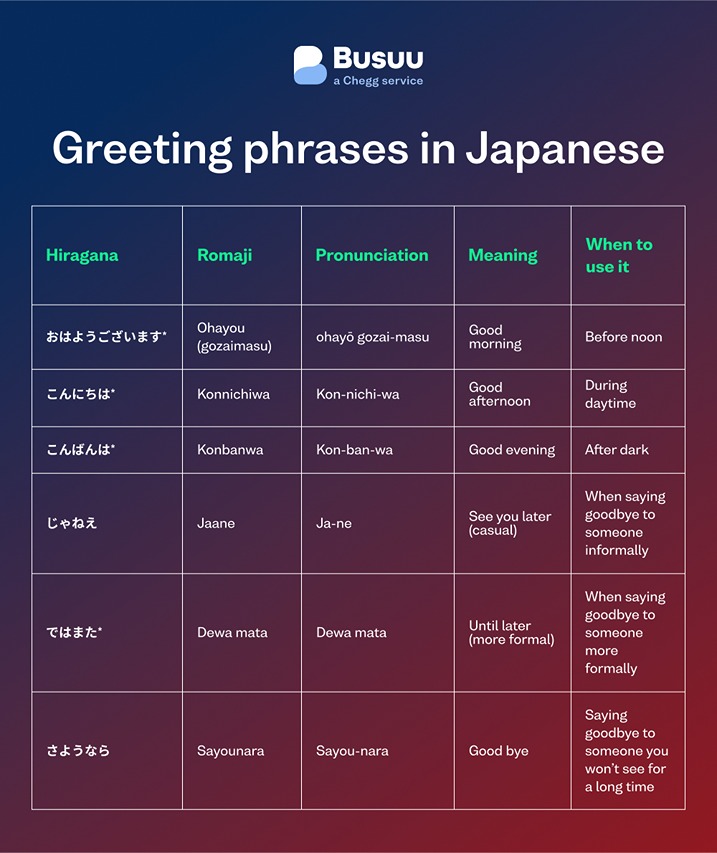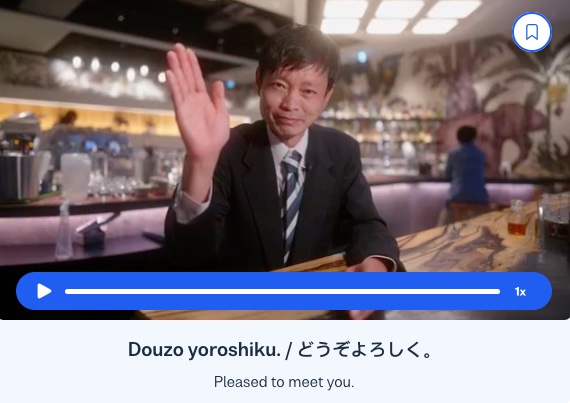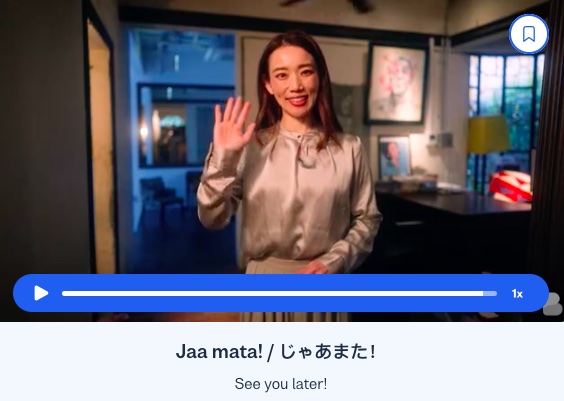14 Basic Japanese Phrases
14 insightful Japanese phrases for your everyday needs.
I want to learn...
If you are planning on traveling around Japan (check out or new travel courses!), you should learn some basic everyday Japanese phrases. They can be used in many situations and will allow you to hold rudimentary conversations with locals. Even if you are not traveling to Japan, you may want to impress your local Japanese restaurant with a few sentences. This guide is for you.
The first section covers some casual greetings. We then move onto some fun phrases that you can use to make conversations a bit more interesting — even for beginners.
Let’s start with the table below. You can use it to practice a few greeting phrases in Japanese and it includes the pronunciation, meaning and when to use them.

Greeting phrases in Japanese
| Hiragana | Romaji | Pronunciation | Meaning | When to use it |
|---|---|---|---|---|
| おはようございます* | Ohayou (gozaimasu) | ohayō gozai-masu | Good morning | Before noon |
| こんにちは* | Konnichiwa | Kon-nichi-wa | Good afternoon | During daytime |
| こんばんは* | Konbanwa | Kon-ban-wa | Good evening | After dark |
| じゃねえ | Jaane | Ja-ne | See you later (casual) | When saying goodbye to someone informally |
| ではまた* | Dewa mata | Dewa mata | Until later (more formal) | When saying goodbye to someone more formally |
| さようなら | Sayounara | Sayou-nara | Good bye | Saying goodbye to someone you won’t see for a long time |
Some of these might sound familiar. It is not uncommon to have heard a character from a popular American TV program saying sayounara. Or perhaps you’ve picked up basic phrases from an anime you like, or the lyrics to a j-pop song.
In Japanese culture and language, people express themselves formally and informally depending on who they’re talking to. This is the case for plenty of other languages, and Japanese is no different in this respect.
Making sure that you’re using the right level of formality is extremely important when greeting people. Formal greetings will come in useful if you want to politely say “hello” to your Japanese teacher, a figure of authority, or someone older than you. Informal greetings are usually reserved for close friends, younger family members, and children.
Note: You may have seen the asterisk next to four of the greetings. Bonus points to you linguists that noticed the hiragana character (は) included in those four phrases. In “ohayou gozaimasu”, the は is pronounced “ha”, as in “haha very funny”. This is why the first word in good morning is “o-ha-yō”. The “ha” sound is phonetically the same as the first two letters in “hat”, “cat” or “mat”. However, only ‘ha’ in “ohayou gozaimasu” has the sound “ha”, otherwise は is pronounced “wa” – we will explain this in more detail later.
は can also become a particle. A particle is a short, functional word which provides a little more context to another word. In English, word order usually does a similar job to particles in Japanese. The word order of the sentence “cats eat mice” shows us that it’s the cat here that’s completing the action. When は hiragana is added to a word to provide context, it’s pronounced “wa”, as in “want”.
You can see in the table that both konnichiwa and konbanwa contain this particle at the end. All you need to know as a beginner is that if you’re looking to translate the hiragana, は is pronounced “wa” when it’s added to the end of a word. To recap: は is pronounced “ha” if it’s inside the word but when it’s working as a particle, it’s pronounced “wa”.
Hungry? It’s time for some fun restaurant Japanese phrases
Big appetite or not, you’ll be glad you learned these expressions.
1. Okawari | お代わり “second helping”, or “refill”
“Okawari” is a great phrase to remember if you want to ask for more food or drink! In Japanese food culture, it’s common to ask for second helpings of tea, water, coffee, or fermented soybeans (called natto).
“Okawari” is a polite way of asking for another portion. The “o” sound — or お in hiragana — at the beginning of the word adds politeness. It’s known as “honorific”.
Below are a few examples of how you could insert _“okawari” _into a phrase to order another water:
- お水のお代わりを下さい。O-mizu no o=kawari o kudasai.
The phrase “okawari” can be used for most foods, but what about when you’re slurping (it’s polite in Japan!) down that ramen something fierce? There’s still a huge bowl of broth left over, but you’ve still not had your fill of noodles. How do you ask for more?
2. Kaedama | 替え玉/かえだま “another serving of noodles”
That’s right — “kaedama” is a Japanese phrase to ask for more noodles, but the word has been used as “replacement” for a long time before then. And why not, when there are ramen, soba, and udon shops all over the place.
If you’re enjoying your noodles and want to load your bowl with more, you may want to give this sentence a try:
- 替え玉をください。Kaedama o kudasai. “More noodles, please.”
“Kaedama” isn’t preceded by a polite “o”? Some moments just don’t call for politeness. We guess that slurping up noodles over and over falls under that category.
Now that you’ve gone ahead and stuffed yourself with sushi, tea, and noodles, you have to pay the check before you leave. How do you ask for the bill?
3. Okanjou o kudasai | お勘定を下さい/おかんじょうをください。
That means “The bill, please.” Make sure you don’t ask for a second serving of the bill!
4. Omakase | お任せ/おまかせ “leave it to someone else”, or “leave it to the chef”
You say “leave it to the chef” in a Japanese restaurant if they want their chef to pick out specialties from the menu. It’s more common in a sushi restaurant, or for an haute Japanese meal. One thing to consider is that with an omakase meal, you can’t work out the cost of it beforehand. So you might be in for a surprise if you order an omakase meal and the bill is more than you were expecting!
Questions in Japanese phrases
If you need help, someone’s opinion on something or if you just want to get to know someone better, being able to ask a question is essential! In Japanese, questions follow some different rules to those in English. We’ll cover one of those rules below. You’ll probably come across a few more in your Japanese learning adventure!
1. Shitsumon shite ii desu ka? | 質問していいですか “May I ask a question?”
A good way to politely open a conversation with someone you don’t know is by saying “shitsumon shite ii desu ka?”. This sentence means “May I ask a question?” That way, you’re less likely to offend someone, especially if you need their help!
You now have someone’s attention and they’ve said “hai” or はい (which is a formal “yes”). How do you ask them for help, say, finding the bathroom?
2. Toire wa doko desu ka? | トイレはどこですか。 “Where is the bathroom?”
Being able to ask where the bathroom is will be useful if you’re traveling through Japan! Many questions in Japanese also have a particle, “ka” or か (which again is at the end of the word). They might answer back with ここに (koko) which means “here” or “over here”.
3. Kore wa ikura desu ka? | これはいくらですか。 “How much is this?”
If you need to buy something in Japan, chances are you’ll want to find out its cost first. By asking the cashier or seller “kore wa ikura desu ka?” you will understand when they respond with “kore wa____-en desu.” This means “This is _ Yen”. “En” is how you pronounce the Japanese currency ¥ or Yen, as it’s spelled in English. It’s spelled 円 in Japanese.
4. O-namae wa? | お名前は? “What is your name?”
If you’re looking to get to know someone a bit better, you’ll usually need to ask them for their name first! “O-namae wa?” is how you ask someone this. “Watashi wa Charlie desu” which would mean “I am Charlie.”
That wraps up our guide to basic Japanese phrases!
In today’s brief lesson on Japanese greetings and restaurant lingo, you learned how to order like a boss. We hope that our explanations of each phrase (as well as formal vs informal in Japanese) will leave you feeling less confused!
Learn Japanese and other languages today!
The best way to learn Japanese and other languages is via the Busuu app. Click below to start learning Japanese – or one of the other 14 languages we offer!

